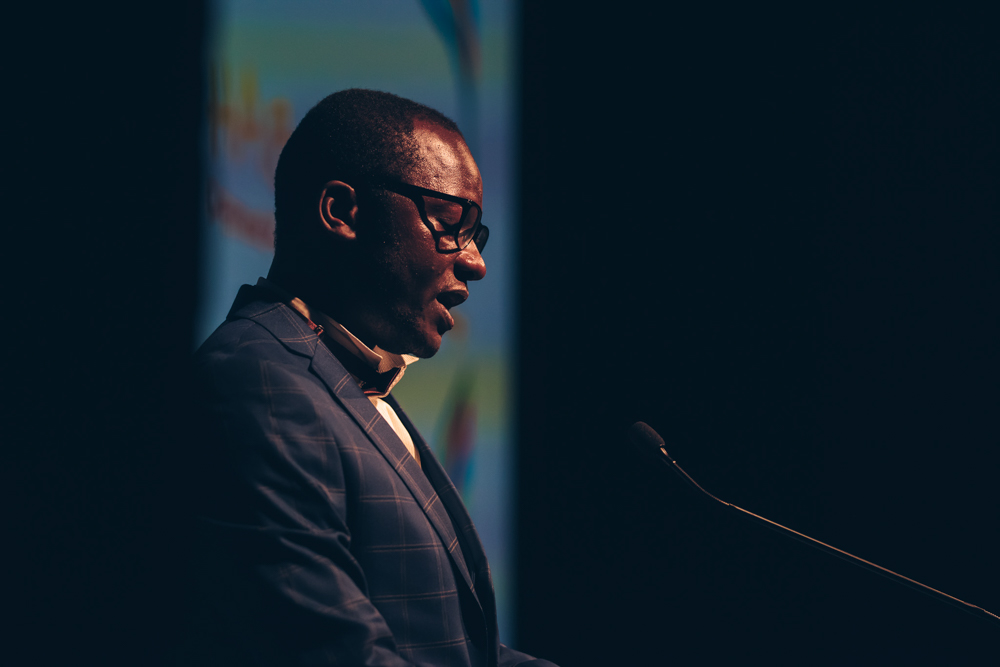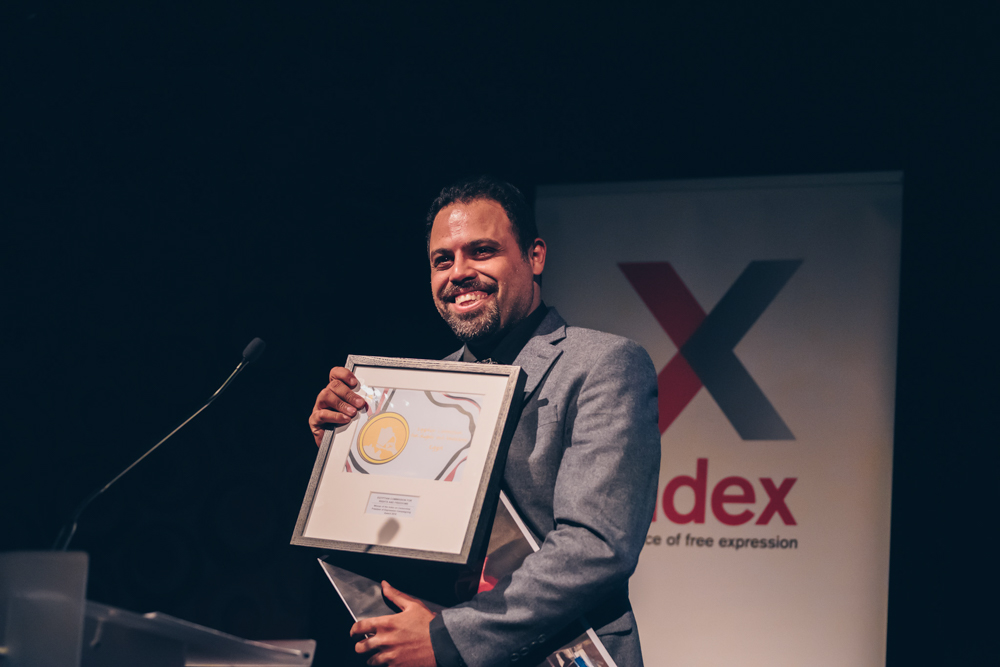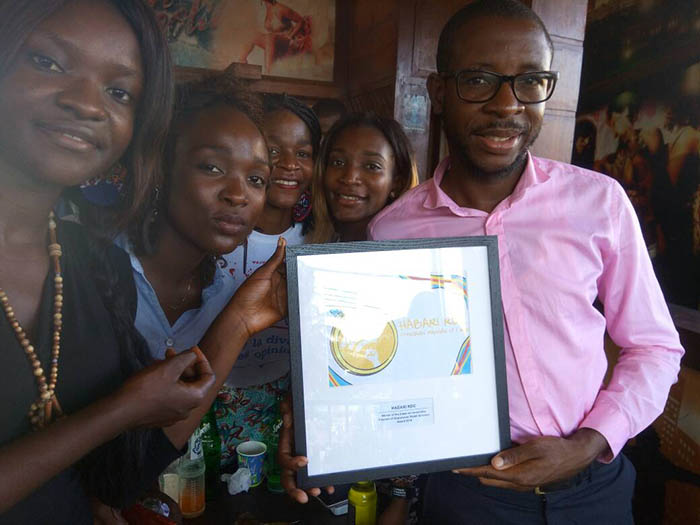8 Apr 2019 | Awards, Fellowship, Fellowship 2018, News and features
[vc_row][vc_column][vc_column_text]

Guy Muyembe of the Digital Activism Award-winning Habari RDC at the 2018 Index on Censorship Freedom of Expression Awards (Photo: Elina Kansikas)
In December 2018, when Index on Censorship last spoke to Habari RDC, the 2018 Index on Censorship Freedom of Expression Award Fellow for Digital Activism, the Democratic Republic of Congo was gearing up for an election that would name a successor to president Joseph Kabila, who had been in power since 2001.
The election, which took place on 30 December 2018, led to much confusion over who has won and the Regulator of Media for Congo forbid the press from publishing provisional results of the election. However, exit polls inevitably began circulating following the vote, causing various candidates and their supporters to claim the win.
“Alliances between political parties are in the process of being reorganised and we do not really know who the opposition is and who is in power,” Guy Muyembe, president of Habari RDC, told Index. “We will probably have until the end of the year to know the identity of each other.”
On the day after the election, authorities in Congo shut down the internet and disrupted SMS services under the guise of tackling fake news. Social media companies were blocked, and Habari RDC’s internet service provider, DHI Telecom, made clear that they had cut Habaris’ connection because their content was deemed to be dangerous.
The shutdown ended on 19 January 2019 and cost the country and its people millions of dollars in revenue.
Although Habari, like many in the Congo, was greatly impacted by the internet shutdown, they had measures in place to ensure they could operate in some capacity. “We have always made sure that our work is not 100% dependent on the internet connection. There are several offline activities where young people from lower-income neighbourhoods take part,” Muyembe said.
When elections are surrounded by doubt, it can be difficult to sift through all of the information and find the facts. Habari makes it a priority to always ensure what they publish is relevant and true.
“We avoid jumping on everything that is published here and there on social networks. Our luck is that we are not a news media outlet,” said Muyembe. “So we take our time to analyse and verify that the information in our possession is accurate.”
Launched in 2016, Habari is a collective of more than 100 young Congolese bloggers and web activists who give voice to the opinions of young people from all over the country. As a group of young Congolese bloggers working in a country where the majority of the population is also young, their work often focuses on issues concerning and relevant to the Congolese youth.
“Reports from various organisations show that more than half of the population is under 30 years of age. So we have to consider them if we want development tomorrow,” said Muyembe.
This year is a busy one for Habari as they work to ensure that youth issues and concerns are both heard and addressed by policymakers in the DRC.
“Habari will organise two programmes each year in partnership with organisations like the I’Institut Français: Facing young people — a moment of exchange between the authorities and young people on issues of general interest; and CaféBlog — a workshop of exchange and training on issues related to the use of the internet and social networks,” said Habari.
As for the future of the Congo, despite a rocky beginning to the year, Habari is hopeful that change is taking place, which will allow for greater freedom of expression in the future.
Muyembe points out that there are things being done now that were not seen during Kabila’s time as president or pre-Kabila. For example, the public radio and television channels now occasionally broadcast activities of those who are not favourable to those in power.
“We must do everything possible so that Congolese society becomes more democratic and allows several contradictory voices to express themselves,” said Muyembe.
Habari has benefited greatly from their position as Index fellows, Muyembe added, as they’ve grown from a locally known organisation to an internationally recognised organisation. They will work with Protection International for a training session in order to help improve the security issues for their bloggers.
As a result of Habari RDC working with Index, “it was easier for it to fit into the landscape of Congolese organisations both in the youth sector and online media. Secondly, it allowed us to network with organisations from other countries to meet future challenges,” said Muyembe.[/vc_column_text][/vc_column][/vc_row][vc_row][vc_column][vc_basic_grid post_type=”post” max_items=”4″ element_width=”6″ grid_id=”vc_gid:1554715549345-45e11f03-8d2c-7″ taxonomies=”10735″][/vc_column][/vc_row]
2 Apr 2019 | Awards, Egypt, Fellowship, Fellowship 2018, Middle East and North Africa, News and features
[vc_row][vc_column][vc_column_text]

Ahmad Abdallah of Campaigning Award-winning Egyptian Commission for Rights and Freedoms at the 2018 Index on Censorship Freedom of Expression Awards (Photo: Elina Kansikas)
The Egyptian government has waged an organised campaign against independent civil society groups and has become increasingly hostile to dissent. The Egyptian Commission for Rights and Freedoms, winner of the 2018 Index on Censorship Freedom of Expression Award for Campaigning, is one of the few human rights organisations still operating in the country. ECRF continues to provide advocacy, legal support and campaign co-ordination, drawing attention to the many ongoing human rights abuses under the autocratic rule of Egypt’s president, Abdel Fattah el-Sisi. Their work has seen them subject to state harassment, with their headquarters being raided and staff members arrested. Regardless of the challenges and threats they face, the organisation is committed to continuing their work.
The May 2018 arrest of Amal Fathy, activist and wife of Mohamed Lotfy, executive director of ECRF, for a Facebook post she made discussing her experience with sexual harassment, has been a major challenge for the organisation. Fathy was released from prison, but a two-year prison sentence still hangs over her, which can be enforced at any time by a court. This sentence has had a significant impact on Fathy and her husband, but the fight for her freedom continues.
“She had huge depression problems when she was in jail, so she’s trying to seek some medical assistance, but still having a verdict that can be implemented any time is very bad for her,” aid Ahmad Abdallah, head of ECRF’s board of trustees.
“Everyone in ECRF believes in freedom and freedom doesn’t come without a price, so everyone is willing to pay that price,” Abdallah added. “We believe in human rights for all Egyptians and we know that this is very precious.”
ECRF continues to expand itself, as they now have three offices outside of Cairo and help from 13 of the 27 governorates, the top-level of public administration, in Egypt.
“Every government in Egypt has different problems than other ones,” said Abdallah. “We don’t have a centralised approach, but rather a decentralised approach and this goes with our mission and vision because we help local human rights defenders; we help them to help themselves and their communities.”
ECRF has been able to help communities in the Aswan governorate, where ECRF has helped them with keeping migrants safe and supported. In the Delta region, which has a serious issue with Gaucher disease, an inherited disorder where a type of fat called glucocerebroside cannot be adequately degraded, ECRF has provided people with legal assistance in their fight to get the government to provide them with medication.
As they expand throughout Egypt, ECRF will continue to develop its capacity to monitor human rights violations. They develop this by training all of the people who approach them wanting to learn how to document violations in their local communities. “We host a lot of training for these human rights activists to give them the technical knowledge on not just how to document violations, but also how to lobby for this, and we provide them with legal assistance whenever needed,” said Abdallah.
A report by Human Rights First looks at how the treatment of prisoners in Egypt, who are often locked up for voicing their political opinions, has led to a drive in recruitment for the Islamic State. Abdallah, who himself was imprisoned and witnessed the radicalisation that often occurs, calls the prisons “terrorist-making machines”. “A lot of the time prisoners are forced to join Isis to take some benefits because they are the most organised body inside prison and a lot of the prisoners, they have nothing, so sometimes people in Isis provide them with food, and provide them with protection in prison,” he said.
ECRF has made their main priority in 2019 to challenge the death penalty, which has already been enforced at least 15 times since the start of the year, with around 50 people at risk of execution at any moment.
“With any other charge, people can have another chance for life, but with execution it’s already over,” said Abdallah. “So this year we are planning to lobby more against the capital punishment in Egypt and we hope that this will be successful,”
For ECRF, being an Index fellow has given them much recognition, which has been hugely important in opening the door to work with other big organisations such as Ushahidi, a technology company they are planning on working with, Abdallah added. “Being an Index fellow has put us on the map as a big organisation that has won such a respected prize. Mostly it helped us to crystallise our vision, and this is the biggest success that we have achieved.”[/vc_column_text][/vc_column][/vc_row][vc_row][vc_column][vc_basic_grid post_type=”post” max_items=”4″ element_width=”6″ grid_id=”vc_gid:1554194959898-530a4dcb-1737-5″ taxonomies=”24136, 25926″][/vc_column][/vc_row]
18 Jan 2019 | Awards Update, Fellowship, Fellowship 2018, News and features
[vc_row][vc_column][vc_column_text]The Index Awards Fellowship has become an important element of Index on Censorship’s work – allowing us to help those on the frontlines of defending free speech around the world. Each fellow receives a structured programme of assistance including capacity building, mentoring and networking. Over the course of a year, we also help them accomplish a key goal that will significantly enhance the impact or sustainability of their work.
The 2018 Fellows are continuing to thrive:[/vc_column_text][vc_single_image image=”103306″ img_size=”full” add_caption=”yes”][vc_column_text]Arts fellow the Museum of Dissidence, led by artist Luis Manuel Otero Alcántara and art curator Yanelys Nuñez Leyva, have put themselves on the line in the fight against Decree 349, a vague law intended to severely limit artistic freedom in Cuba. In November, the two were arrested for peacefully protesting the law. Index campaigned for their release at a solidarity protest at Tate Britain.
Having missed our Freedom of Expression Awards ceremony in April 2018, we were thrilled to present Nuñez Leyva and Otero Alcántara with their award in October at Metal Culture Southend, an arts centre where they were taking part in a two-week residency.[/vc_column_text][vc_single_image image=”99812″ img_size=”full”][vc_column_text]Campaigning fellows the Egyptian Commission for Rights and Freedoms continue to highlight human rights abuses and provide support for those facing repression. The group has expanded its reach by opening two new offices around the country and has benefited from technology training provided by Index. Amal Fathy, wife of ECRF executive director Mohamed Lotfy, was released from prison in late December after eight months in detention for her online criticism of sexual harassment in Egypt, but a two-year prison sentence was upheld against the activist, raising fears she could again end up behind bars. Index continues to campaign for Amal at international level.[/vc_column_text][vc_single_image image=”99888″ img_size=”full” add_caption=”yes”][vc_column_text]Digital Activism fellow Habari RDC, a collective of more than 100 young Congolese bloggers and web activists, have been busily covering December’s tense election in the Democratic Republic of Congo and its fallout. Guy Muyembe, president of Habari RDC, said before the elections: “The only thing that is certain about the election is the uncertainty that comes with it.” The continuing tensions threaten to destabilise the country, insecurity and violence. Index has arranged training for Habari RDC with Protection International which will take place early this year.[/vc_column_text][vc_single_image image=”99885″ img_size=”full” add_caption=”yes”][vc_column_text]Journalism fellow Wendy Funes continues to cover corruption and human rights violations in Honduras, a country where violence has become “normalised”. With the help of Index, Wendy is in the process of securing an office for her newspaper which will create a safe space for her team to do their work. She also plans to open the space to other journalists and offer training to students. Wendy has been selected as a judge for the UNESCO/Guillermo Cano World Press Freedom Prize and has been able to attain funding which will cover some of her investigations for 2019.[/vc_column_text][vc_single_image image=”99904″ img_size=”full” add_caption=”yes”][/vc_column][/vc_row][vc_row][vc_column][vc_basic_grid post_type=”post” max_items=”4″ element_width=”6″ grid_id=”vc_gid:1547745843103-843df51b-4519-5″ taxonomies=”8935″][/vc_column][/vc_row]
22 Aug 2018 | Awards, Awards Update, Fellowship, Fellowship 2018, News and features
[vc_row][vc_column][vc_column_text]
Since winning the Index on Censorship Freedom of Expression Award Fellowship for Digital Activism, Habari RDC, a collective of Congolese bloggers and web activists giving voice to the opinions of the country’s young people, has celebrated its second birthday.
Reflecting on its successes since July 2016 and the challenges still to come, Guy Muyembe, president of Habari, tells Index on Censorship: “It’s worth noting that Habari RDC started out as just an informal collective of Congolese bloggers, with no recognised structures or official documents. Being recognised by the Congolese state as a legally established organisation has been a great success.”
As well as the Index on Censorship award, Habari RDC was one of three beneficiaries of the Francophone Awards for Innovation in the Media and was selected for the Dutch NGO RNW Media’s Citizen’s Voice programme. “This programme provides us with an annual endowment that covers our running costs, but also with consistent editorial support, which enables Habari RDC to produce quality blog posts,” Muyembe says.
Habari’s website now ranks among the biggest online news outlets in the country and its Facebook page is one of the most popular among Congolese users.
As the organisation grows, it is becoming more ambitious and most now focus on further training for its staff. “We feel a great need to step up our expertise,” Muyembe says. “We are particularly interested in learning how to evaluate the impact of our activities, but also in social media training.”
In July, Habari received training from the University of Essex’s Tim Fenton on reporting on elections. “The training was very useful and came at the right time, as the election period approaches. It will help us to perfect a proper work plan for the election coverage.”
A presidential election is due to take place in the Democratic Republic of the Congo on 23 December 2018, more than two years behind schedule. Muyembe’s greatest hope for the election is peace. “Like many of my compatriots, I’m tired of war,” he says. “Free and democratic elections would certainly cement the legitimacy of the leaders and put an end to this cycle of war.”
On June 10 2018, Luc Nkulula, a democracy activist and a leader in the peaceful movement against president Joseph Kabila’s rule, died in a suspicious fire at his home in the eastern city of Goma. Nkulula was an active member of the citizens’ movement Struggle for Change.
“Luc Nkulula’s death is a great shock and a great challenge for all Congolese activists. To be honest, it has shown how dangerous being an engaged citizen can be. Far from discouraging the activists, though, this has galvanised them,” Muyembe says.
Muyembe tells Index that violations against the media are widespread and have lead to an overall decrease in the quality of journalism, which is especially problematic in the run-up to an election.
“Journalists are forced to self-censor or even to compromise their principles in order to keep working, but our experience with Habari RDC has shown that treating information fairly is one of the main ways for media organisations to protect themselves against certain predators of the press,” he says. “It is in the interests of media organisations in the Congo not to side with political groups or constituencies. As it happens, online organisations have more freedom than other media — television, radio, newspapers — and they must make the most of that.”
Muyembe says online media is freer as the government is “not yet capable of controlling the internet”. However, as political tensions in the country have escalated, more threats to online freedoms are emerging. “There is a risk of another complete internet shutdown if the political crisis reaches fever pitch, but it is fair to say that Congolese netizens enjoy great freedom when compared to neighbouring countries in Central Africa,” Muyembe says.
Ahead of the election, Habari will be focusing on social cohesion and inclusive government. The country has been in crisis since independence in 1960. “Most of the leaders who have governed the country since then have encountered issues of legitimacy,” Muyembe says. “In that same time, the people — especially the young — have faced great poverty: more than half the population lives on less than $1 per day, according to the World Bank’s statistics.”
Because of these problems, Muyembe says huge hopes hinge on December’s election.
“We will train our bloggers so that they will be better equipped to confront issues, but also to enter into a dialogue with the decision-makers so that their programmes can give more consideration to young people’s concerns,” Muyembe says. “This is where this year’s elections become so important to us: they will enable us to try to get the decision-makers to take young people’s issues into account.”[/vc_column_text][vc_row_inner][vc_column_inner width=”1/4″][vc_column_text]
[/vc_column_text][/vc_column_inner][vc_column_inner width=”3/4″][vc_column_text]
Index works with the winners of the Freedom of Expression Awards Fellowship to help them achieve goals through a 12-month programme of capacity building, coaching and strategic support.
Through the fellowships, Index seeks to maximise the impact and sustainability of voices at the forefront of pushing back censorship worldwide.
Learn more about the Freedom of Expression Awards Fellowship.[/vc_column_text][/vc_column_inner][/vc_row_inner][/vc_column][/vc_row][vc_row][vc_column][vc_basic_grid post_type=”post” max_items=”4″ element_width=”6″ grid_id=”vc_gid:1534944945145-5b5e9c82-86f0-8″ taxonomies=”24389″][/vc_column][/vc_row]



